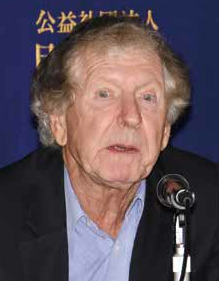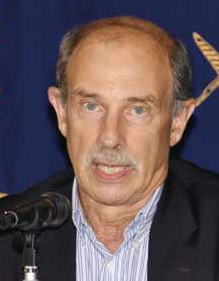Issue:
The state of the fourth estate
A panel of veteran foreign correspondents looks at the results of recent upheavals in the media world, and makes some observations about the days ahead.
by JULIAN RYALL
These are, without a doubt, testing times for the profession of journalism. There is the seemingly inexorable rise of social media compounded by a large part of the general public afflicted by a shrinking attention span. Traditional media outlets are seeing falling advertising leading to falling revenues causing falling investment in journalists and, inevitably, falling standards. Too often the media seems to succumb to the easy allure of click bait over quality reporting.
And if those worries were not enough to keep a hack awake at night, the world has a U.S. president who labels anything that does not reflect his own world view as “fake news,” damaging and degrading the perception of what even the most reputable of media outlets produces.
That accusation of “fake news” is, in turn, increasingly being bandied about by those on the receiving end of unflattering coverage to tarnish anyone or anything that questions their motives. We saw it in the recent British general election, and in Japan, when the Liberal Democratic Party attempted to get their licks in even before the July 2 vote for the Tokyo Metropolitan Assembly, perhaps sensing that they were about to suffer a drubbing. “It has become difficult for us to convey our policies [to the public] because of media reports,” said Prime Minister Shinzo Abe during a campaign speech in western Tokyo on June 30, the Asahi Shimbun reported.
Abe was referring to media coverage of his own trials and tribulations over suggestions that he intervened to influence ministry level decisions on two educational establishments, and that his defense minister, Tomomi Inada, had called on members of the Self Defense Forces to vote for the LDP in the election.
“If we slip up when speaking, the media immediately jump all over us,” claimed an apparently offended Toshihiro Nikai, secretary general of the LDP. “If you think you can make our candidates unsuccessful, just do it. If the media think that they are the only entities that can influence the election outcome, then they are completely wrong.”
YET TESTING TIMES ARE precisely when quality journalism should come to the fore and fulfill its remit of informing and enlightening readers, listeners or viewers, said Bill Emmott, editor in chief of the Economist for 13 years from 1993, a columnist for publications that include La Stampa, Nikkei Business and the Financial Times as well as being the author of 13 books.“For journalists and journalism, this is a difficult but also a very good period for us,” he told the Freedom of the Press Dinner at the FCCJ on July 5. “We have to fight to make sure that our voices are heard because they are voices of credibility and authority and we have value as analysts. But we also need to raise our collective game because while information is abundant the understanding of that information is far more scarce,” he said.
“The problem we face in journalism is getting noticed and being believed”
Emmott was part of a three member panel of speakers invited to the Club to discuss the future of journalism. Also at the top table was Philip Bowring, a writer for the Far Eastern Economic Review for the majority of the two decades between 1972 and 1992, only interrupted by a spell at the Financial Times. He subsequently spent 19 years as a columnist for the International Herald Tribune. With other expatriate journalists, Bowring founded the Hong Kong based Asia Sentinel in 2006 as a digital heir to the now defunct FEER and Asiaweek, while he also contributes to a number of publications as a freelance columnist and works as an author and consultant.
The third member of the panel was Urban Lehner, who spent 33 years at the Wall Street Journal as a reporter, editor and executive, with two spells as a correspondent in Tokyo over a total of eight years. He subsequently spent nine years as editor inchief and vice president of DTN/The Progressive Farmer, based in Omaha, Nebraska, and is the author of a number of books, including The Asia Factor in U.S.Japan Relations.
While these three stalwarts of the media industry with well over a century of experience in newsrooms or other media work places between them enjoyed some of the “golden years” of journalism, just how bleak is the outlook for the business now?
THE CHALLENGES, THEY AGREED, are abundant. At a fundamental level, the number of print titles of years gone by has shrunk, said Bowring, pointing out that one of the three largest publications that he wrote for has not survived. (The Far Eastern Economic Review ceased publication in December, 2009.) “Because of the economic constraints on these publications, primarily caused by declining advertising revenues or readership, there has been a move towards an oligopoly of the old media, but we are also seeing that in the new media,” he said.
It is a similar story in the book publishing world, he pointed out, where the 30 something major English language publishers may still exist in name, but are now mostly owned by three or four large groups. Consequently, he said, there is less diversity in the types of books that are being published; a similar consolidation has taken place in the media world and, in precisely the same way, diversity has been sacrificed.
The dawning of the digital era initially promised to deliver greater diversity and, initially, maybe it did because countless small, net based publications cropped up to cater to every niche interest. It quickly became apparent, however, that revenue was the problem. “Old media” lost revenue as its traditional advertisers and readers fragmented to alternative outlets, but “new media” were not able to earn vast sums because of the online business model and have not and still have not come up with a viable method of taking cash from an online reader base.
The outcome is that old media has less revenue and hence less to spend on traditional in depth investigative stories, extensive background research and even newsroom headcount. Perhaps most worryingly for foreign correspondents, there is also less cash available for permanent overseas postings, as titles rely on stringers, casuals, wire services and even, among the more unscrupulous, simply lifting other publications’ work.

“There has been a move towards an oligopoly of the old media.”

“The future of journalism is anything but certain.”

“Information is abundant, the understanding of that information is far more scarce.”
“We have seen the diminishment of professional news services in terms of numbers, but have we seen a compensation through improved quality?” Bowring asked. “It would be hard to say that the quality of the surviving mainstream media has increased. There is, instead, an increased reliance on cut and paste journalism, which has been exacerbated by the likes of Yahoo and Google.” Such news aggregator sites are “effectively stealing copy,” Bowring added, meaning that revenue is going to the intermediary companies rather than the original producers of the news.
LEHNER WAS FACED WITH a direct choice between the new and the old when he retired from the Wall Street Journal 14 years ago, he admitted. The choice was between the editorship of a city newspaper in Ohio and a data and technology company in Nebraska. The decision was made, he said, after he visited both companies and had a chance to speak to some of the employees.
At the Ohio newspaper, writers used the opportunity to justify why he should not cut their beats if he took over. It was not, he said, a happy place. The other company, which provided data on commodity prices and weather to farmers, wanted Lehner to oversee its transition from a technology company to a media company delivering information that was not being suddenly provided for free on the Internet.
And while the decision was not easy “one consideration was that if I became the editor of a print publication, my friends would ‘understand’,” he said he went to the data firm and built an award winning team of news writers and analysts. “I believe providing that sort of business to business information is one of the futures of journalism,” he said.
Emmott linked the problems in the journalism world to broader problems of democracy and the role of the media in modern day democracy. “If we look at the history of journalism and the media, it is clear that it goes through ups and downs,” he said. “This is one of the oldest professions and a time when papers were pristinely ethical cannot be identified, so the media has always grappled with issues such as advertorials, sponsored sections and so on.
“But I believe the real problem we face in journalism today is getting noticed and being believed, ” he said. “Journalists have lost the strong position they once held as providers and channels of information. Information is now abundant, communicating information is abundant, so journalists no longer have the dominant position.
EMMOTT SAID THAT A worrying paradox is that while information is abundant and freely available, fewer people now worry about the freedom of speech. He pointed to the pressure being exerted on the government of Qatar over Al Jazeera “one of the bright lights of the last decade and one that has led to a much more liberated media in the Arab world” while U.S. President Donald Trump has apparently reveled in a video clip purporting to show him wrestling CNN to the ground.
For Lehner, the question of the future of journalism is closely linked to how information will be delivered 20 years or more from now. While the majority of the millennial generation access their daily dose of news via their mobile phones at present, that will surely change in the future.
But with falling earnings for the media and suggestions from some quarters that governments should directly fund the media (“a terrible idea and a slippery slope to censorship”), Lehner concluded that “the future of journalism is anything but certain or stable.”
Bowring, however, remained more optimistic and suggested that the antics of Trump may even have helped the print sector. “People are becoming more choosy again,” he said. “We are seeing a revival of print in the book trade and we see the survival of print publications long after people thought they would be dead.”
That is borne out by recent figures that show the New York Times which Trump has derided as “failing” – recorded a net jump of 300,000 digital news subscriptions in the January to March quarter alone, a record high growth. Equally, revenue from digital subscriptions is up 40 percent on the same period last year.
The industry can only hope that the reading public continues to choose quality over quantity and informed sources over rumors.
Julian Ryall is Japan correspondent for the Daily Telegraph.

